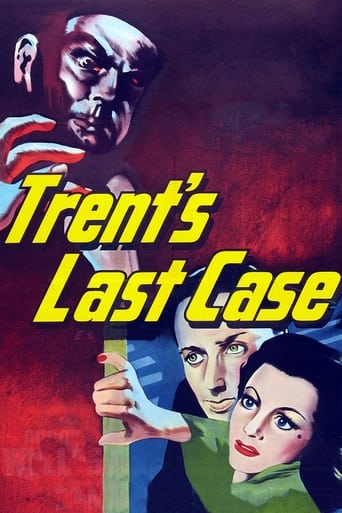JohnHowardReid
Copyright 29 October 1952 by Republic Pictures Corp. An Imperadio Pictures (London) Production. New York opening at the Little Carnegie: late November-early December 1953 (exact date unknown). U.S. release: 1 January 1954. U.K. release through British Lion: 2 February 1953. Australian release through London Films: 26 February 1953. 90 minutes.
SYNOPSIS: An international financier dies mysteriously. His wife and male secretary are the chief suspects.NOTES: Third film version of Bentley's 1913 novel. Other versions were made in 1920 (with Gregory Scott as Trent, directed by Richard Garrick) and 1929 (with Raymond Griffith as Trent, directed by Howard Hawks). For a while there, it looked as if Trent's first book was also to be his last, but Trent's Own Case (written in collaboration with Herbert Warner Allen) followed in 1936 and Trent Intervenes (a collection of short stories) in 1938. COMMENT: Although he plays the title role with considerable grace and charm-and receives top billing-Michael Wilding takes a distinct fourth place in the film's advertising to Margaret Lockwood, John McCallum and Orson Welles. Michael's lucky that he has a head shot at all. True, Miss Lockwood is very charismatic-and so is Mr Welles-but charisma is a quality that Mr Wilding (and McCallum too for that matter) signally lack, competent (and even likable) though their performances are. However, all the players are beautifully lit and photographed. For the most part, acting, script and direction maintain viewer suspense and interest rather well. Unlike previous versions, this one follows the novel very closely. This is both an asset and a liability. At the time of its first publication, Bentley's novel struck new ground. Trent is neither a super-detective like Sherlock Holmes or a criminal like Raffles or an oddball like The Thinking Machine or a dilettante like Philo Vance, Ellery Queen, Reggie Fortune and Lord Peter Wimsey. He is a working artist and journalist who is not only human enough to fall in love with the chief suspect in Trent's Last Case but to get his "solution" to the mystery completely wrong! Wilding handles Trent most convincingly. His portrayal is probably the most accurate of a well-known fictional detective ever presented on the screen. But it's not enough, alas, to completely justify a tale that is overloaded with talk and understaffed with action. However, it's not really until near the end (when we just get too bone-tired of all the explanations and re-explanations) that our interest starts to wilt.In the meantime, as I say, we have plenty to occupy our minds and hearts. Welles' appearance is deliberately held back to obtain the maximum suspense, but we do have the lovely Lockwood, plus a nice offbeat performance by Sam Kydd (of all people) to divert us in the meantime. Hugh McDermott plays a somewhat shady secretary with surprising ease. And, thanks to adroit acting by all involved and clever editing, the whole courtroom scene comes across with style, humor and tension. Yes, director Wilcox does his level best with Bentley's over-detailed material. Production values (including some wonderful sets) are nothing if not lavish.
Marco Trevisiol
With an acclaimed murder-mystery novel that had a great subversive, twist ending as its source, "Trent's Last Case" should've been cracking entertainment.Alas, the director is Herbert Wilcox who had a lengthy and largely successful career but even his popular films haven't aged well due to his pedestrian, uninventive style and he's a forgotten figure today. His patented conservative, dreary direction largely sinks this film almost immediately. The early segment at the coroner's inquest is so boring one struggles to maintain interest. The film does improve a bit though once Trent begins to investigate and challenge the official version of events.And there are some nice performances from a very good cast. Orson Welles displays another of his vivid characterisations in his brief role. John McCallum gives an impressive performance as someone with plenty to hide; his facial reactions when Trent reveals he knows most of his secrets makes the scene quite compelling. However, overall this film is a major disappointment. The final scene which tries to be both a revelation of who the actual murderer was AND be a romantic ending is especially poorly handled.
dbborroughs
Armchair detective gets involved in the case of the death of a rich man. The inquest says suicide- but ends are left hanging so Trent investigates.Stoggie formal British mystery with Orson Welles in flashbacks playing the dead man with a pointy nose, too much make up and raised eyebrows. He's in over acting mode chewing the scenery in his "look at me style". He's in the film for just over ten minutes but all I remembered was his bad acting and silly nose.As for the rest of the film it's an okay time waster, but it's not much beyond that. It's a long 90 minutes
brice-18
It's good news for Welles completists that this, the better of the two films he made for Herbert Wilcox in 1952 (to help finance his on-off-on but finally magnificent film of 'Othello') is now available on DVD, though dismally free of extras. As a thriller it is a puzzle almost devoid of suspense, though there are some clever twists at the end. There are polished performances by Margaret Lockwood, John McCallum, Michael Wilding as the classy sleuth Trent, Miles Malleson in one of his best roles and Welles. Welles appears for no more than 20 minutes, in flashback, but, with his formidable false nose, is an intimidating presence as the late Sigsbee Manderson. In a fraught dialogue with McCallum he talks about 'Othello' and the production he's recently seen: "Didn't like the leading actor!" The leading actor was Welles himself, performing at the St James' theatre - a performance I was privileged have seen a year or two earlier, when Ken Tynan, long before PC was thought of, headed his review 'Citizen Coon'!


